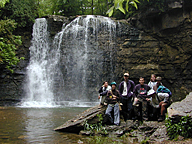Workshop Overview
Note: this workshop took place in 2005.
Format and goals
- Plenary sessions: Participants discussed general issues such as how to help students visualize important hydrologic concepts, how to incorporate hydrogeologic projects into courses, and the place of hydrogeology in the geoscience curriculum. We also discussed the unique differences in how hydrogeology is done in the "real world" and in academia, and how to best train hydrogeology students to be successful in both environments.
- Demonstration sessions: Participants shared strategies for actively engaging students in the classroom and for providing effective and innovative lab experiences. Some of the demonstration sessions were geared towards helping those with less experience in hydrogeology learn effective ways of teaching "the basics".
- Dealing effectively with the "fear factors": The mathematical and chemical aspects of hydrogeology are common stumbling blocks for students. The workshop had both presentation and discussion sessions focused on how to use mathematics and chemistry to teach concepts in hydrogeology.
- Field trip: A one-day, mid-workshop field trip to two sites, one instrumented and one not, allowed us to explore how field observations of a variety of kinds could be integrated into and complement the other components of a hydrogeology course.
- Working groups: All participants were part of working groups whose tasks were to develop plans for collecting and creating new materials in key thematic areas.
- Teaching materials collection: Participants contributed to development of the collection Resources for Teaching Hydrogeology similar to the collections Resources for Teaching Petrology and Resources for Teaching Structural Geology. Workshop attendees also participated after the workshop in follow-up activities designed to develop and/or test new materials for teaching hydrogeology.
- Email List: A email list for workshop participants promoted discussion before and after the workshop.
Dates
The first workshop event took place at 7 pm on Saturday, July 23, and the last on Thursday, July 28. Participants must attend all sessions.Eligibility and application instructions
Applicants for this workshop must hold a faculty position and teach hydrogeology at a two- or four-year college or university. We welcomed applications from all academic ranks. The workshop was limited to 70 participants, and the final list of participants was established with the goal of assembling a group representing a wide range of experiences, educational environments, and specialties.Cost
On-site costs. The National Science Foundation provided funding for the operational costs of the workshop plus room, board, and workshop materials for the participants. To be supported by these funds, a participant must be either a US citizen, a permanent resident, or in the employ of a US institution. If you don't meet these requirements and are interested in participating in this workshop at your own expense, please contact the workshop conveners.
Travel. All participants or their home institutions must provide transportation to and from the workshop. The workshop will be held at the University of Nebraska, Lincoln in Lincoln, Nebraska. Participants must make their own way to the University of Nebraska in time for the first workshop event at 7 pm on Saturday, July 23. The workshop will be over in time for participants to take late afternoon flights out of Lincoln. Lincoln Airport is just off Interstate 80 at exit 399, only 3 miles from campus, and participants have the choice of renting a car or taking a cab. Lincoln Airport is served by American, Northwest, and United Airlines.
We will be able to offer small travel stipends to participants from institutions unable to cover travel costs.


